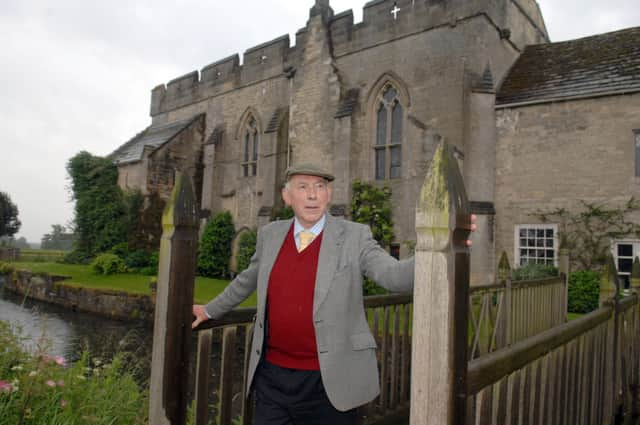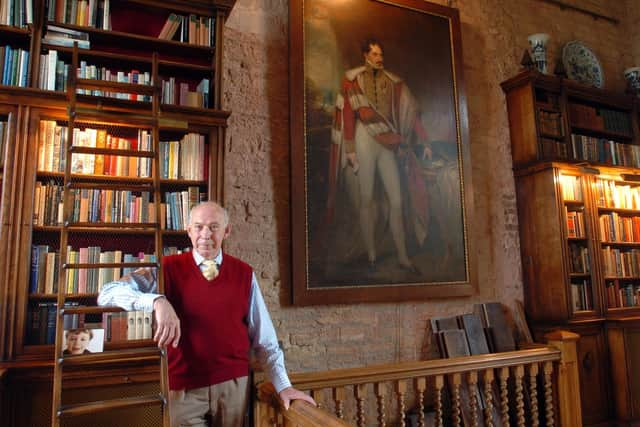Obituary: Ian Curteis, playwright


Ian Curteis, who has died at 86, was a playwright and dramatist who in the 1980s stirred controversy when he accused the BBC of left-wing bias by declining to screen the documentary drama on the Falklands War which it had commissioned him to write.
In more recent times, he became known in Yorkshire for his continuing restoration of Markenfield Hall, near Ripon, the family home of his third wife, Lady Deirdre Hare. The two of them opened the hall and its grounds to the public.
Advertisement
Hide AdAdvertisement
Hide AdIt was a world away from the media storm of four decades earlier instigated by The Falklands Play, which starred with Patricia Hodge as Margaret Thatcher and James Fox as the Foreign Secretary Lord Carrington. It remained on the shelf for nearly 20 years before finally being shown.


The BBC defended itself at the time by saying the piece was “too sensitive” to be aired in the run-up to the 1983 election, but Mr Curteis said his favourable portrayal of a Prime Minister attempting to do her best for the nation did not chime with the Corporation’s political agenda. Four years later, he repeated his attack on “left-wing drama” at the Edinburgh Television Festival in a speech which gained him a lasting reputation as a conservative voice.
The son of a bank manager, Ian Curteis was born in London and educated at Slough Grammar. He was injured during his national service and spent three years working in a factory in Slough while completing his studies, eventually gaining a place at Queen Mary College, London.
At the same time he was working as part-time stagehand at Joan Littlewood’s Theatre Workshop in the East End, a melting pot for aspirational practitioners of the new wave of drama that was fermenting.
Advertisement
Hide AdAdvertisement
Hide AdHe slept on dressing room floors while dissecting and studying the plays being rehearsed, convinced that if he could master the mechanics of a great play he could eventually write one of his own.
He graduated to weekly repertory, and in 1962 became a trainee drama director at the BBC, assigned to episodes of Z-Cars and Pity About the Abbey, a satirical 1965 play in which John Betjeman suggested that Westminster Abbey might be demolished to make way for a bypass.
But by the end of the decade he had decided that his future lay in writing rather than directing. In 1971 he turned out three scripts for the BBC under the umbrella title Long Voyage Out of War, and biographical dramas about Beethoven and Alexander Fleming. He also became a regular contributor to such popular and long-running series as Granada’s Crown Court and the BBC’s Doomwatch and the The Onedin Line.
But it was the 1977 Cold War drama Philby, Burgess and Maclean, with Anthony Bate and Derek Jacobi, that established Curteis’ reputation as a top-drawer dramatist. The following year in Hess, he recreated the secretive 1941 arrival in Scotland of Hitler’s deputy in a futile attempt to negotiate peace.
Advertisement
Hide AdAdvertisement
Hide AdBut the creative stand-off that The Falklands Play instigated eventually made Curteis persona non grata at the BBC, and it was Granada to whom he returned for perhaps his most successful production, an adaptation of the Bradford playwright JB Priestley’s evocation of the world of the British music hall, Lost Empires. Starring Colin Firth and Laurence Olivier, it was shown on ITV at the height of the controversy on the other channel.
Curteis, meanwhile, was happy enough to be portrayed as the “other voice in British broadcasting”, even going so far as to list “dissidence” as his recreational pastime. However, a drama which he said would rehabilitate “to some degree” the reputation of the 1930s British Fascist leader Oswald Mosley was abandoned
Curteis married three times, first to Joan Macdonald, then in 1985 to the author Joanna Trollope, and finally in 2001 to Lady Deidre, widow of the 7th Lord Grantley. She survives him, with two sons from his first marriage, two stepdaughters and two stepsons.
Comment Guidelines
National World encourages reader discussion on our stories. User feedback, insights and back-and-forth exchanges add a rich layer of context to reporting. Please review our Community Guidelines before commenting.